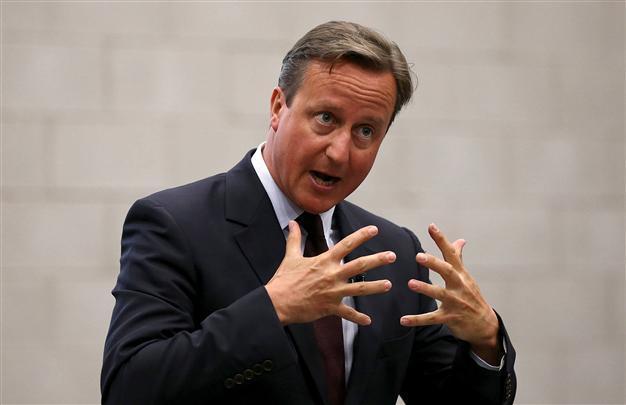Britain to take 'thousands more Syrian refugees': Cameron
LISBON - Agence France-Presse

Reuters Photo
Britain will take in thousands more Syrian refugees, Prime Minister David Cameron said on Sept. 4 amid growing pressure at home and abroad to address the crisis."Given the scale of the crisis and the suffering of the people, today I can announce that we will do more, providing resettlement for thousands more Syrian refugees," he told reporters on a visit to Lisbon.
"We will continue with our approach of taking them from the refugee camps," he added, in a reference to UN camps on the Syrian border.
"This provides them with a more direct and safe route to the UK, rather than risking the hazardous journey which has tragically cost so many lives," the prime minister said.
Cameron did not specify how many more refugees Britain would accept, saying only that more details would be announced next week and that the resettlement scheme would be kept "under review".
"Britain will act with our head and our heart, providing refuge for those in need while working on a long term solution to the Syria crisis," Cameron said.
Britain has faced mounting pressure to accept a greater share of Syrian refugees, especially after the publication this week of harrowing images of a three-year-old Syrian toddler found dead on a Turkish beach.
A petition to parliament urging Britain to accept more refugees has garnered nearly 360,000 signatures, while campaign group Avaaz said that 2,000 Britons had volunteered to host refugee families.
Several editorials in Britain harked back to the times when Britain accepted huge numbers of refugees before and after World War II, and around the Balkan wars of the 1990s.
Britain has accepted 216 Syrian refugees under a special government scheme over the past year and around 5,000 Syrians have been granted asylum since the conflict there broke out in 2011 -- far fewer than countries like France, Germany and Sweden.
More than four million Syrians have fled the war, many of them taking refuge in neighbouring Lebanon, Turkey and Jordan.
Britain has also opted out of a quota system for relocating asylum seekers within the European Union despite growing calls in the EU for fairer distribution.
On the streets of London, views on the issue varied.
"I can't believe that we haven't done anything before now," said 45-year-old Victoria Buurman as she walked with her shopping in central London.
"I think it's disgusting that we have to get to a point where children are dying before we even recognise that we're not acting morally. It's horrific," she said, breaking into tears.
But Souvik Ghosh, a 26-year-old research student from India, said Britain should not take any more migrants.
"There should be some limitations, OK? Because otherwise this country's economic system will be overflowed," he said.
Contenders for the leadership of the main opposition Labour Party have all urged Cameron to do more.
One of them, Yvette Cooper, has urged Britain to immediately accept 10,000 more Syrian refugees, while bookmakers' favourite Jeremy Corbyn added there was no "electric fence and military solution" to the crisis.
"It's a humanitarian crisis and it must be solved by human beings acting in a humanitarian way," he said.
Several MPs from Cameron's own Conservatives also urged the prime minister to do more.
"Our common humanity demands action at home and abroad," said Tom Tugendhat, who represents part of the Kent region where many undocumented migrants arrive on ferries or through the Channel Tunnel.
There was also criticism from elsewhere in Europe, with the Council of Europe's Commissioner for Human Rights, Nils Muiznieks, saying he was "seriously concerned" by Cameron's position.
"While it is true that long-term peace should be brought to Syria and other war-torn countries, it is also true that the UK has a legal and moral obligation to offer shelter to those who flee war and persecution," he said.
"The truth is that at the moment the UK is doing much less than other European countries".
Peter Sutherland, the UN special representative on international migration, told the BBC that while some countries were "massively bearing the burden" of the migrant crisis, Britain was among those that "can do more".
















